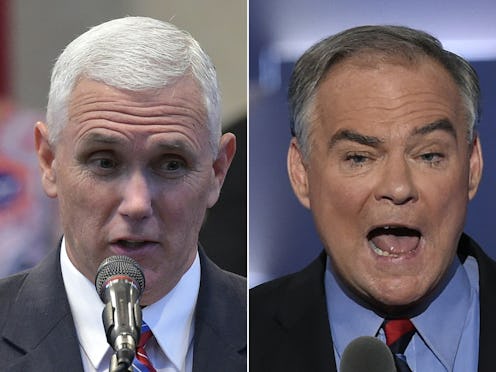News
Neither Tim Kaine Nor Mike Pence Won The VP Debate
We’ve made it through the first and last vice presidential debate of the 2016 cycle. As you might have expected, the lone meeting between Tim Kaine and Mike Pence was a markedly more lackluster affair than the surreal forum between Hillary Clinton and Donald Trump that we witnessed last week. But who won the vice presidential debate? The winner was neither Kaine nor Pence.
When the dust settled, neither candidate ended up looking particularly good. Kaine had the facts and substance of the issues on his side, and deployed several effective attacks against Trump. For example, his repeated requests that Pence defend Trump's more odious positions, which Pence often didn't do. However, Kaine also came across as overeager and aggressive, browbeating Pence throughout the debate and, on several occasions, prompting moderator Elaine Quijano to ask him not to interrupt. In that sense, Pence came off as more presidential.
Pence did the exact opposite. His demeanor was far more calm, measured, and patient than that of his opponent. But Kaine attacked the Trump/Pence ticket mercilessly — usually by quoting Trump's own words on Russia, nuclear proliferation, immigration and much more — and in most instances, Pence didn't have much of a response. He often responded simply by shaking his head sadly and sighing under his breath, which is not an effective counterargument. At other points, Pence either changed the subject or simply ignored what Kaine said — also an ineffective form of rebuttal. In this sense, Kaine came across as more presidential.
The back-and-forth between Kaine and Pence was essentially a wash, but that doesn't mean nobody won the debate.
When this debate started, Clinton had a healthy lead over Trump, and with a few exceptions, she's maintained that lead throughout this election cycle. Her poll numbers, both nationally and in swing states, jumped significantly after her first debate with Trump, and as of this writing, FiveThirtyEight gave her around a 75 percent chance of winning the election.
Because the trajectory of this race favors Clinton, anything that doesn't fundamentally alter that dynamic is effectively a victory for her. So, Clinton was the de facto winner of what was ultimately a not-terribly-eventful vice presidential debate.
The Kaine-Pence matchup, while important on its own merits, will most likely be forgotten as soon as Clinton and Trump take the stage again on Sunday. That’s not a knock on either of the vice presidential candidates, but simply a reflection of the fact that both Kaine and Pence are, at the end of the day, pretty garden-variety politicians. The same can’t be said of either Clinton or Trump, both of whom are wholly unique presidential candidates — albeit in very, very different ways.
Nevertheless, the VP debate did have some value. A candidate’s choice of running mate speaks volumes about their own values and judgement, and when the forum kicked off, around 40 percent of Americans didn’t even know who Kaine and Pence were. The debate was their biggest opportunity to introduce themselves to voters, and introduce themselves they did.
But again, Clinton has been the moderate favorite to win this election for the majority of the cycle, and she was the favorite when the VP debate kicked off. Nothing terribly revelatory happened during the Kaine-Pence match-up and so Clinton, by default, was the winner. In all likelihood, she'll remain the favorite to win when she and Trump meet for the second presidential debate five days from now.
